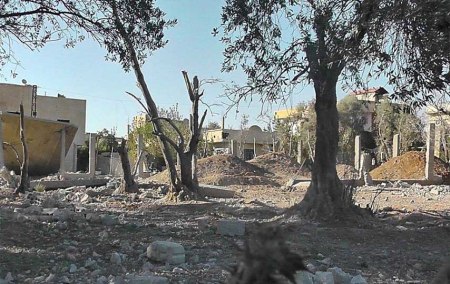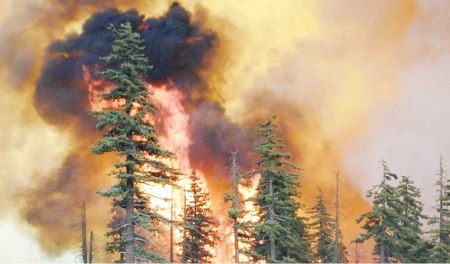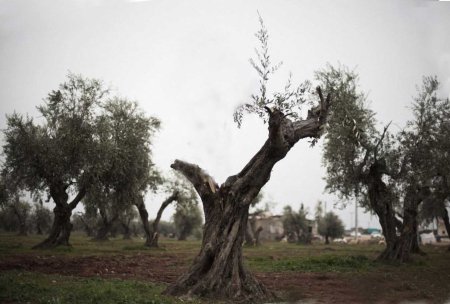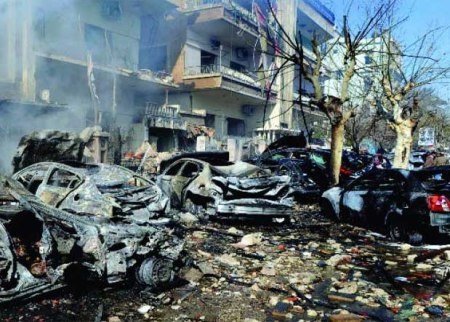Alaa Halabi As-Safir
Trees in Syria die too
The war that is ravaging Syria for more than three years has caused major destruction and affected the Syrian civilization on all levels. It has spared neither humans, animals, or plants, and especially affected forest, be it directly or indirectly. The war has at times set Syria’s green forests on fire, while it has subjected them to woodcutting for heating at other times.
Even though there are no large forests in Syria and natural forests in Syria cover just 232.8 hectares, the forests that existed before the start of the war served as a lung for this Mediterranean state. Syria sought to expand the forest area patches before 2011. It granted them major attention amid perceived security and prosperity in the country. This attention turned natural habitats into one of the priorities of the government, as well as into the scene of social and cultural events.
Then war broke out and let this wealth gradually disappear.
There are no statistics about the extent of the damage to forest areas in Syria, the agricultural country whose citizens always appreciated the value and importance of trees. However, according to estimates of the Ministry of Agriculture, there is “major damage” in forest areas, be it caused by war fire or by woodcutting.

A source in the Ministry of Environment told As-Safir that the border areas with Turkey, where there were many forests, are the most affected, either due to the war or to arson. The largest fire broke out in the Zainiyeh forest on the western end of Jisr al-Shughour.
The source explained that even the initial loss estimates were colossal, knowing that the economic value of the trees is estimated at about 200,000 US$. The source pointed out that the restoration of this forest requires hundreds of years.
Another fire broke out in Kassab, on the border with Turkey in the countryside of Latakia. The fire reached the 4,500 hectare (11,120 acre) Foronlok reserve and destroyed about 150 hectare (371 acre) of pine trees and old semi-virgin oak trees.
The Abu Qubeis area was victim to a fire that affected 6 hectare (15 acres) of forest trees, including Pinales and Pistacia atlantica. In Quneitra province, several fires broke out in 2012 in the areas of Bir Ajam, Bariqa, Ayn al-Tineh, al-Hamedia and the Taranjah forest. Hundreds hectare of oak trees were burnt.

While initial estimates of the Ministry of Environment in Syria showed that losses due to fire had reached billions of dollars, the same estimates showed very substantial losses, as citizens and criminal gangs cut down trees either to turn them into charcoal or to directly use them for heating.
According to estimates, a lot of reserves, forests and forest areas are exposed to excessive woodcutting, including the al-Belas reserve in the province of Hama, where hundreds of old forest trees, of about 100 years of age, were cut down, in addition to the forests extending from the Tel Kelekh area down to Tartous province.
The estimated number of trees that have been cut down in Hama and Tel Kelekh is about 7,000. In Hasakah, the number of trees that have been cut down is about 7,500 — most of which are from the Mount Abdul Aziz reserve — where there are two types of pistacia, the Pistacia atlantica and the Pistacia khinjuk. The infringements have also affected the Assad forest and other forest areas in al-Saraka area in Maghlooja, as well as afforestation sites in al-Shahidi.
In Quneitra, the Jbata reserve suffered woodcutting of entire woods. The initial estimate is between 100 to 300 forest trees. About 100 stone pine trees aged 15 to 20 years were chopped down in al-Shahar in south Jbata.

As the Ministry of Environment focuses in its estimates on forest areas and forests, it should be noted that public gardens and parks located within the cities are the hardest-hit areas, as most of the parks in the battle-ridden cities or outside government control are witnessing wood-cutting operations for heating purposes.
The source in the Ministry of Environment said that there were major fears of infringements this year, especially in light of the continuing war on the one hand, and given the fuel and electricity crises on the other. The government lost control over oil wells, and power transformer stations were subject to several infringements that caused power cuts and longer rationing hours. This portends a harsh winter that will prompt citizens to commit further infringements in search of warmth.
Cutting down wood to sell as firewood or charcoal is a profession practiced by a number of citizens, organized into “gangs” that cut down trees and sell them in the market in many ways. The preferred method is the initiation of forest fires as a prelude to burning the trees, according to a source in the fire station.
The source asserted that Syria’s forests and forest areas had turned, amid the state of lawlessness in some areas and the absence of sufficient control in other areas, into lucrative “mines,” especially after the government had lifted the price of diesel to 80 Syrian pounds (0.50 US%). The cost of storing 1,000 liters (enough for a small family in winter), if available, has reached 80,000 Syrian pounds (500 US$), which is the equivalent of a four-month salary for an average employee who earns about 20,000 Syrian pounds. This will inevitably prompt citizens to look for heating alternatives. Firewood and charcoal are the most easy choices.
Although discussing the major environmental damage caused by the destruction of forests may seem pointless and futile in light of the ongoing war in Syria — with all its human, social, and cultural implications — the source in the Ministry of Environment stressed that the effects of the environmental devastation on Syria would be extensive.
The source pointed out that the return of forests and forest areas to the state they had been in before the war might require hundreds of years and affect various aspects of life. Meanwhile, desertification seems to be creeping in from the east to the center of Syria under black clouds resulting from the primitive oil extraction and refining. The source stressed the need for various sides and parties to take action and end the disaster.

Trees in Syria die too
The war that is ravaging Syria for more than three years has caused major destruction and affected the Syrian civilization on all levels. It has spared neither humans, animals, or plants, and especially affected forest, be it directly or indirectly. The war has at times set Syria’s green forests on fire, while it has subjected them to woodcutting for heating at other times.
Even though there are no large forests in Syria and natural forests in Syria cover just 232.8 hectares, the forests that existed before the start of the war served as a lung for this Mediterranean state. Syria sought to expand the forest area patches before 2011. It granted them major attention amid perceived security and prosperity in the country. This attention turned natural habitats into one of the priorities of the government, as well as into the scene of social and cultural events.
Then war broke out and let this wealth gradually disappear.
There are no statistics about the extent of the damage to forest areas in Syria, the agricultural country whose citizens always appreciated the value and importance of trees. However, according to estimates of the Ministry of Agriculture, there is “major damage” in forest areas, be it caused by war fire or by woodcutting.

A source in the Ministry of Environment told As-Safir that the border areas with Turkey, where there were many forests, are the most affected, either due to the war or to arson. The largest fire broke out in the Zainiyeh forest on the western end of Jisr al-Shughour.
The source explained that even the initial loss estimates were colossal, knowing that the economic value of the trees is estimated at about 200,000 US$. The source pointed out that the restoration of this forest requires hundreds of years.
Another fire broke out in Kassab, on the border with Turkey in the countryside of Latakia. The fire reached the 4,500 hectare (11,120 acre) Foronlok reserve and destroyed about 150 hectare (371 acre) of pine trees and old semi-virgin oak trees.
The Abu Qubeis area was victim to a fire that affected 6 hectare (15 acres) of forest trees, including Pinales and Pistacia atlantica. In Quneitra province, several fires broke out in 2012 in the areas of Bir Ajam, Bariqa, Ayn al-Tineh, al-Hamedia and the Taranjah forest. Hundreds hectare of oak trees were burnt.

While initial estimates of the Ministry of Environment in Syria showed that losses due to fire had reached billions of dollars, the same estimates showed very substantial losses, as citizens and criminal gangs cut down trees either to turn them into charcoal or to directly use them for heating.
According to estimates, a lot of reserves, forests and forest areas are exposed to excessive woodcutting, including the al-Belas reserve in the province of Hama, where hundreds of old forest trees, of about 100 years of age, were cut down, in addition to the forests extending from the Tel Kelekh area down to Tartous province.
The estimated number of trees that have been cut down in Hama and Tel Kelekh is about 7,000. In Hasakah, the number of trees that have been cut down is about 7,500 — most of which are from the Mount Abdul Aziz reserve — where there are two types of pistacia, the Pistacia atlantica and the Pistacia khinjuk. The infringements have also affected the Assad forest and other forest areas in al-Saraka area in Maghlooja, as well as afforestation sites in al-Shahidi.
In Quneitra, the Jbata reserve suffered woodcutting of entire woods. The initial estimate is between 100 to 300 forest trees. About 100 stone pine trees aged 15 to 20 years were chopped down in al-Shahar in south Jbata.

As the Ministry of Environment focuses in its estimates on forest areas and forests, it should be noted that public gardens and parks located within the cities are the hardest-hit areas, as most of the parks in the battle-ridden cities or outside government control are witnessing wood-cutting operations for heating purposes.
The source in the Ministry of Environment said that there were major fears of infringements this year, especially in light of the continuing war on the one hand, and given the fuel and electricity crises on the other. The government lost control over oil wells, and power transformer stations were subject to several infringements that caused power cuts and longer rationing hours. This portends a harsh winter that will prompt citizens to commit further infringements in search of warmth.
Cutting down wood to sell as firewood or charcoal is a profession practiced by a number of citizens, organized into “gangs” that cut down trees and sell them in the market in many ways. The preferred method is the initiation of forest fires as a prelude to burning the trees, according to a source in the fire station.
The source asserted that Syria’s forests and forest areas had turned, amid the state of lawlessness in some areas and the absence of sufficient control in other areas, into lucrative “mines,” especially after the government had lifted the price of diesel to 80 Syrian pounds (0.50 US%). The cost of storing 1,000 liters (enough for a small family in winter), if available, has reached 80,000 Syrian pounds (500 US$), which is the equivalent of a four-month salary for an average employee who earns about 20,000 Syrian pounds. This will inevitably prompt citizens to look for heating alternatives. Firewood and charcoal are the most easy choices.
Although discussing the major environmental damage caused by the destruction of forests may seem pointless and futile in light of the ongoing war in Syria — with all its human, social, and cultural implications — the source in the Ministry of Environment stressed that the effects of the environmental devastation on Syria would be extensive.
The source pointed out that the return of forests and forest areas to the state they had been in before the war might require hundreds of years and affect various aspects of life. Meanwhile, desertification seems to be creeping in from the east to the center of Syria under black clouds resulting from the primitive oil extraction and refining. The source stressed the need for various sides and parties to take action and end the disaster.

Keine Kommentare:
Kommentar veröffentlichen